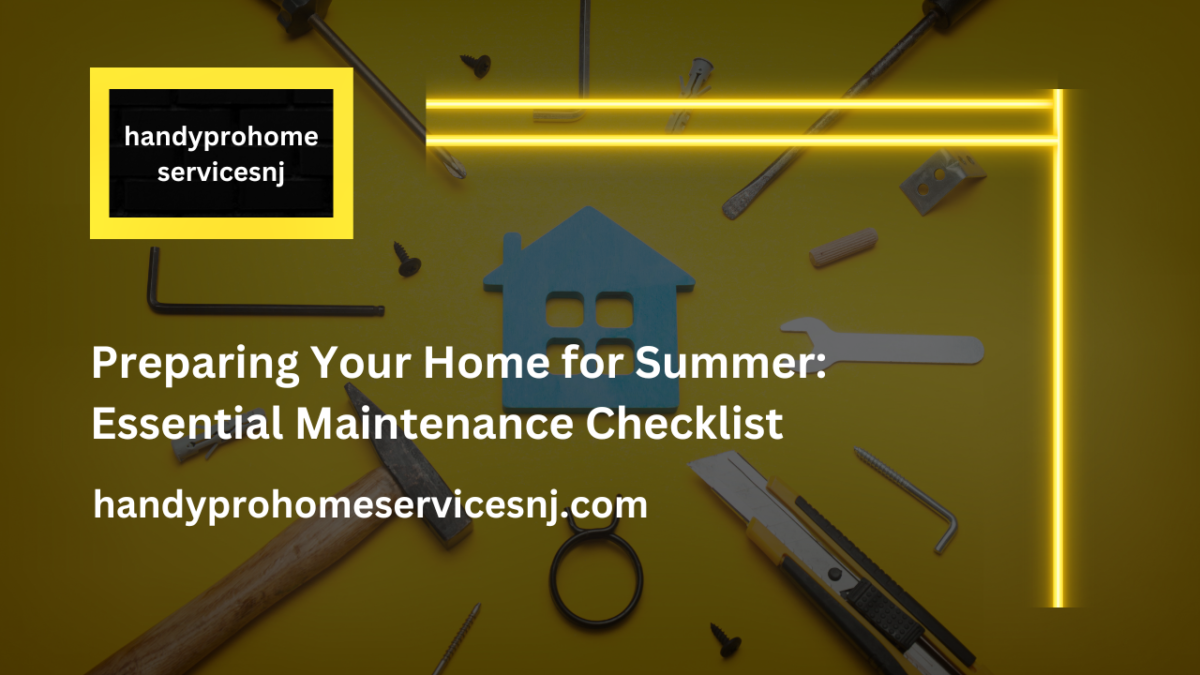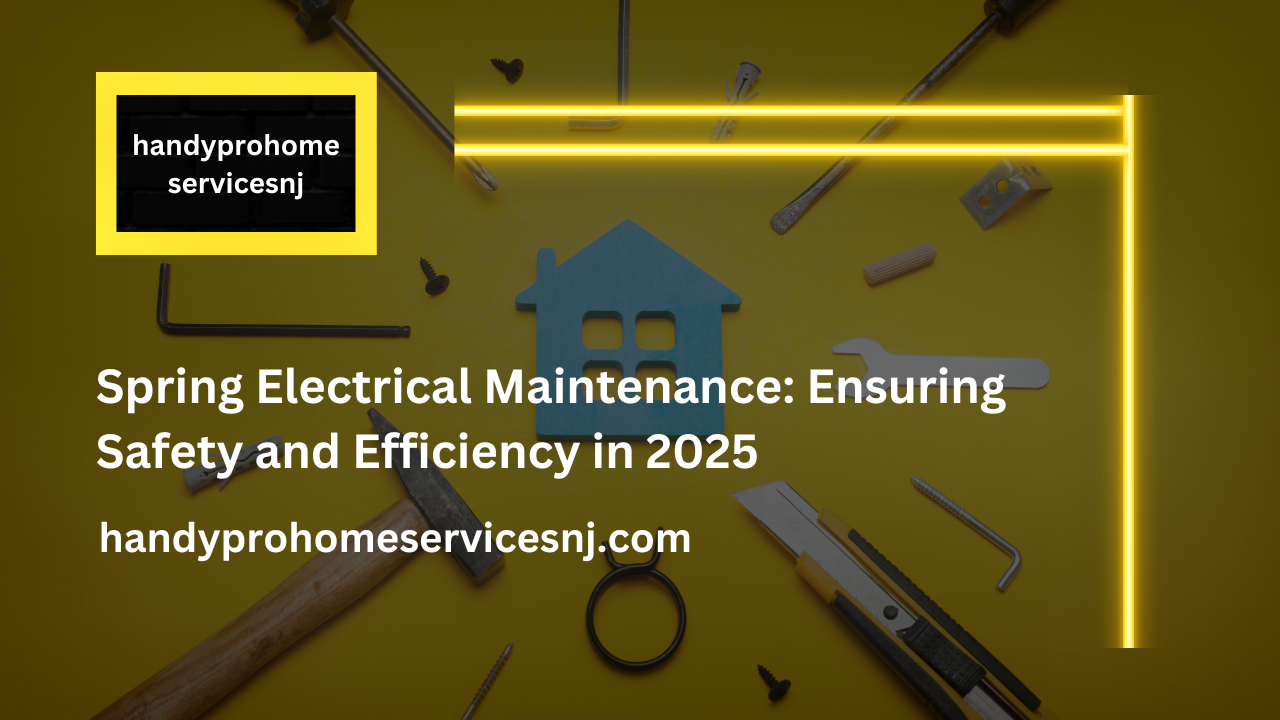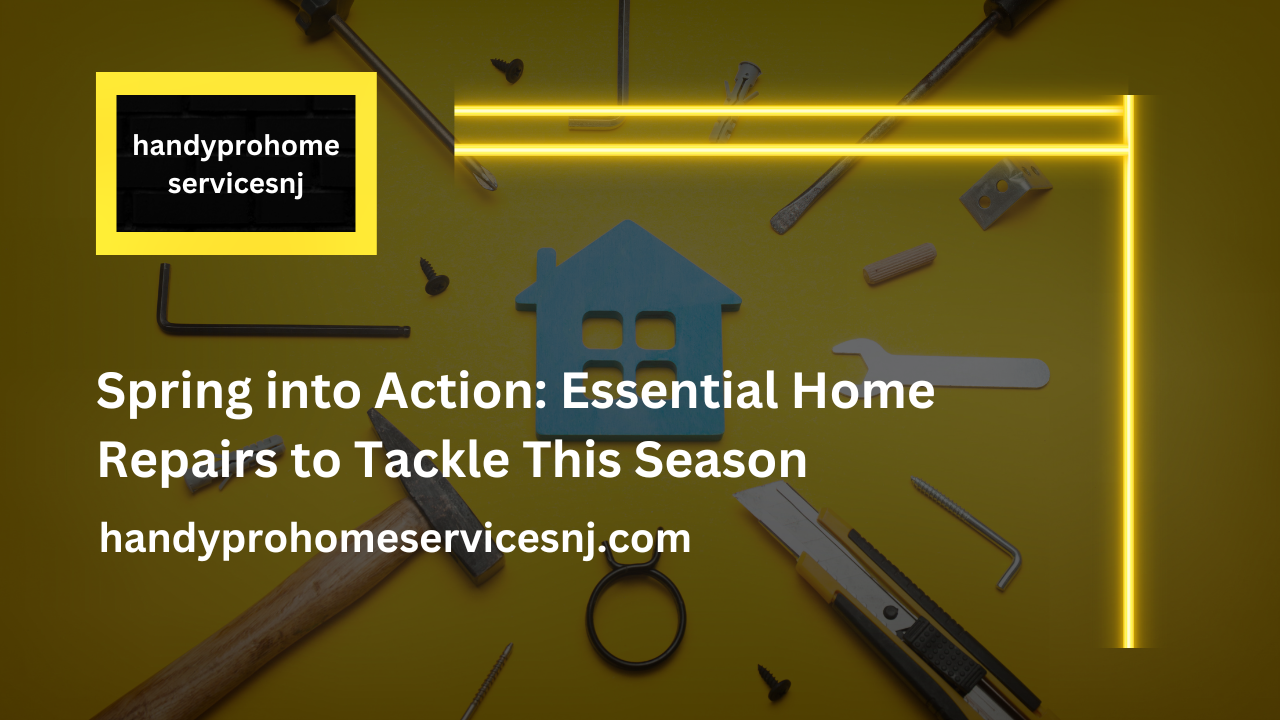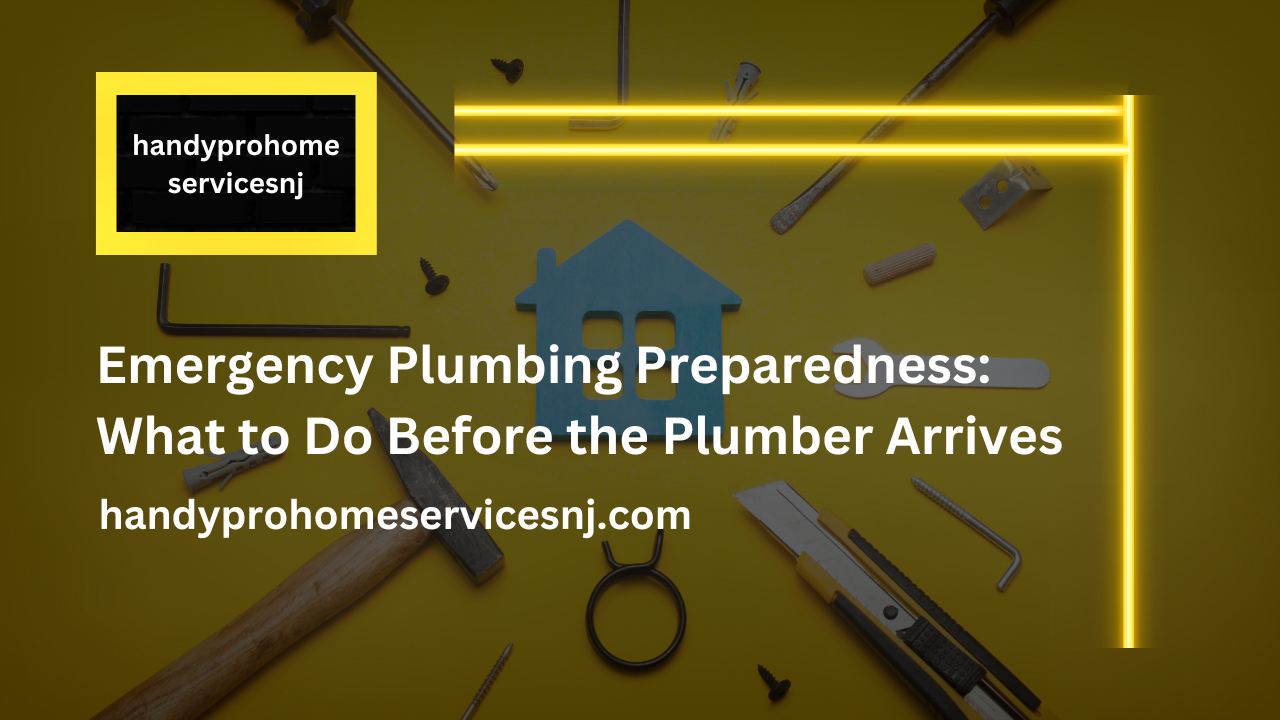Preparing Your Home for Summer: Essential Maintenance Checklist

Spring Electrical Maintenance: Ensuring Safety and Efficiency in 2025
May 7, 2025Key Takeaways
- Regular summer home maintenance prevents costly repairs, with 40% of homeowners facing major expenses that could have been avoided with proper upkeep
- A comprehensive seasonal checklist should prioritize HVAC systems, roof/gutter inspection, and outdoor living spaces to ensure comfort and efficiency
- New Jersey homeowners should account for specific regional challenges like humidity, sudden storms, and seasonal pests
- The average homeowner spends $3,192-$4,000 annually on home maintenance—planning ahead saves both money and stress
- Professional handyman services can efficiently handle complex tasks or help complete multiple maintenance items at once
Summer in New Jersey brings backyard barbecues, cool evening breezes on the porch, and unfortunately, the potential for home maintenance issues to become glaringly apparent. That small leak you’ve been ignoring? The AC that made strange noises last fall? They’re about to demand your attention at the most inconvenient time.
According to HomeAdvisor, 65% of Americans find home maintenance projects at least somewhat stressful, and nearly 60% delay necessary repairs due to financial constraints. But procrastination comes with a price tag—one that typically grows larger the longer you wait.
Let’s break down the essential summer home maintenance tasks that deserve your attention now, before small issues transform into budget-busting emergencies during the hottest months of the year.
The True Value of Pre-Summer Maintenance
Protecting Your Investment and Peace of Mind
Your home is likely your largest investment, but it’s also your sanctuary—a place that should provide comfort and security, especially during summer when you’re seeking refuge from the heat. A comprehensive summer home maintenance checklist isn’t just about preserving property value; it’s about ensuring your family’s comfort, safety, and well-being during the months you’ll rely on your home’s systems the most.
When you consider that approximately 40% of homeowners have had to pay for major home repairs they believe could have been avoided with better upkeep, the value of prevention becomes crystal clear. Those few hours spent inspecting, cleaning, and performing minor repairs this spring could save you thousands of dollars and countless headaches when summer hits full force.
The Ripple Effect of Deferred and Preventive Upkeep
The relationship between maintenance and major repairs follows a predictable pattern: small issues, when left unaddressed, inevitably grow into larger, more expensive problems. That tiny roof leak might seem insignificant during dry spring days, but summer thunderstorms will quickly reveal how damaging water infiltration can become.
If you’ve already tackled your spring maintenance (if not, check out our guide on Spring into Action: Essential Home Repairs to Tackle This Season), you’ve laid excellent groundwork. Now it’s time to focus specifically on preparing your home for the unique challenges of summer.
The Essential Exterior Checklist for Summer Readiness
Roofing, Gutters, and Drainage Systems
Your home’s first line of defense against summer storms starts at the top. Here’s what to look for:
- Inspect roof shingles or tiles for damage, lifting, or missing pieces
- Clear gutters and downspouts of winter debris and ensure proper water flow
- Check for proper drainage away from your foundation
- Look for signs of leaks in the attic or ceiling stains that might indicate roof problems
New Jersey’s summer thunderstorms can be intense, making proper drainage essential. A professional from Handy Pro’s Home Repair Services can spot potential issues you might miss, especially in hard-to-reach areas of your roof.
Siding, Paint, and Exterior Walls
The exterior finish of your home takes the brunt of weather damage year-round. Summer preparation should include:
- Examining siding for cracks, warping, or damage that could allow water intrusion
- Checking for peeling paint that might indicate moisture problems
- Inspecting for mold or mildew growth on north-facing walls
- Looking for signs of pest activity like carpenter ants or termites
If your home’s exterior needs more than spot treatment, consider professional NJ Painting Services to ensure proper preparation and application, which extends the life of the exterior finish.
Windows and Doors
Windows and doors are common sources of energy loss, allowing your expensive cooled air to escape. Before summer:
- Check window and door seals for cracks or gaps
- Replace weatherstripping that’s damaged or compressed
- Inspect window screens for tears that might let insects in
- Test the operation of windows to ensure they open properly for ventilation
- Check doorknobs, locks, and hinges for proper operation
For windows that are beyond DIY repair or have failing seals between panes, consider Window Installation Services to improve both comfort and energy efficiency.
Interior Maintenance: Keeping Cool and Efficient
Air Conditioning and Ventilation
How well is your home prepared to keep you cool during a New Jersey heatwave?
Your HVAC system deserves priority attention in your summer home maintenance checklist:
- Replace air filters (or clean if they’re the reusable type)
- Clear debris from outdoor condenser units
- Test your system before the first heat wave arrives
- Check ductwork for leaks or disconnected sections
- Consider professional maintenance to clean coils and check refrigerant levels
Professional HVAC maintenance typically costs $75-$200, but according to Energy Star, this preventive service can reduce cooling costs by up to 15% and prevent expensive emergency repairs during peak summer rates.
| Maintenance Task | DIY or Pro? | Approximate Cost | Potential Savings |
|---|---|---|---|
| Replace air filters | DIY | $10-$30 | 5-15% energy savings |
| Clear outdoor unit | DIY | Free | Prevents system failure |
| Clean condenser coils | Pro | $100-$200 | 10-15% efficiency improvement |
| Check refrigerant | Pro | Part of service call | Prevents system damage |
| Inspect ductwork | Pro | $300-$500 | Up to 30% energy savings |
Plumbing and Water Leak Checks
With increased summer water usage for lawns, gardens, and pools, your plumbing system needs attention:
- Check under sinks for signs of leaks or corrosion
- Inspect visible pipes in basements or crawl spaces
- Test outdoor spigots and hoses for leaks or damage
- Look for signs of water damage on ceilings, floors, or walls
- Check your water heater for signs of leaking or corrosion
For those concerned about water leaks, our article on How to Handle a Water Leak in West Long Branch NJ Homes provides detailed guidance. For repairs beyond your comfort level, Handy Pro Plumbing Services can tackle even the most complex issues.
Electrical Safety and Functionality
Summer brings increased electrical usage from air conditioning, fans, and outdoor lighting:
- Test GFCI outlets in kitchens, bathrooms, and outdoor areas
- Inspect extension cords for damage or fraying
- Check ceiling fans for proper operation and stability
- Examine outdoor lighting for weather damage
- Review your electrical panel for signs of overheating
Understanding electrical warning signs can prevent dangerous situations. Our guide on Warning Signs of Faulty Electrical Wiring helps identify issues before they become hazards.
Outdoor Spaces: Revitalize for Summer Living
Decks, Patios, and Outdoor Living Areas
Your outdoor living spaces will see heavy use during summer months:
- Inspect deck boards for rotting, splintering, or nail pops
- Check railing stability to ensure safety
- Clean and seal wooden decks to protect from sun and moisture damage
- Examine patio pavers for shifting or uneven surfaces
- Clean outdoor furniture and inspect for damage
According to the North American Deck and Railing Association, decks should be professionally inspected every 1-2 years. With proper maintenance, a wooden deck can last 10-15 years, while composite decking often lasts 25-30 years with minimal upkeep.
Fencing and Landscaping
The boundary of your property needs attention too:
- Inspect fence posts and panels for stability and damage
- Trim trees or branches that could fall during storms
- Check for plants growing against the house that could retain moisture
- Examine irrigation systems for leaks or coverage issues
- Clear pathways of tripping hazards
Driveways, Walkways, and Entry
First impressions matter, and your home’s approach sets the tone:
- Repair cracks in concrete or asphalt to prevent water damage
- Clean surfaces of stains and debris
- Check exterior lighting for proper operation
- Examine handrails for stability and weather damage
- Consider updating your entry door or hardware for a fresh look
Budgeting and Planning for Summer Maintenance
Understanding Typical Home Maintenance Costs
How much should you budget for home maintenance?
Home maintenance costs can vary widely depending on your home’s age, condition, and size. However, recent statistics provide helpful benchmarks:
Homeowners spend an average of $3,192-$4,000 annually on maintenance and emergency repairs, according to ZipDo Education and ConsumerAffairs. The U.S. Census Bureau notes that homeowners who have lived in older homes for at least 10 years spend about $1,500 annually, while new owners of older homes spend approximately $3,900 per year.
Perhaps most concerning, Erie Insurance reports that over 60% of homeowners are unprepared for both routine and unexpected maintenance costs. This lack of preparation often leads to deferred maintenance, which ultimately costs more in the long run.
A common budgeting guideline suggests setting aside 1-2% of your home’s value annually for maintenance. For a $300,000 home, that’s $3,000-$6,000 per year.
Creating Your Personalized Seasonal Home Checklist
Developing a seasonal maintenance schedule helps distribute costs throughout the year:
- Create a master inventory of all home systems and components
- Assign maintenance tasks to appropriate seasons
- Estimate costs for regular maintenance items
- Build in contingency funds for unexpected repairs
- Consider service agreements for major systems
Here’s a simple template for organizing your summer maintenance priorities:
- Priority 1 (Safety/Preventing Damage): HVAC, roof/gutter inspection, plumbing checks
- Priority 2 (Comfort/Efficiency): Window/door seals, insulation, ceiling fans
- Priority 3 (Aesthetics/Enhancements): Painting, landscaping, deck refinishing
When DIY Isn’t Enough: The Value of Professional NJ Handyman Services
Assessing When to Call a Pro
While many maintenance tasks are DIY-friendly, others require professional expertise:
- Electrical work beyond simple fixture replacement
- Plumbing issues involving supply lines or drainage systems
- Structural repairs to decks, roofs, or foundations
- HVAC maintenance requiring specialized tools or knowledge
- Multiple small projects that would benefit from bundled service
Professional NJ handyman services offer efficiency and expertise that often justifies their cost. When your to-do list grows overwhelming, hiring help isn’t just convenient—it’s smart financial planning.
What to Look for in NJ Handyman Services
Finding the right professional makes all the difference:
- Verify proper licensing and insurance for your protection
- Check reviews and references from other homeowners
- Ask about warranties on work performed
- Discuss timeline and communication expectations
- Request detailed estimates before work begins
Handy Pro Home Services offers comprehensive solutions for New Jersey homeowners, with experienced professionals who understand the unique challenges of homes in our region.
Seasonal Maintenance Tips for New Jersey Homeowners
Accounting for NJ-Specific Weather and Climate Patterns
New Jersey summers present unique challenges:
- Humidity management to prevent mold and mildew
- Storm preparedness for sudden, intense thunderstorms
- Pest control for mosquitoes, ticks, and other seasonal pests
- Heat management during temperature spikes
- Basement moisture control during humid periods
One of the most overlooked aspects of summer home maintenance in New Jersey is humidity control. Excess moisture can damage wooden structures, encourage mold growth, and create unhealthy indoor air. Consider using dehumidifiers in basements and crawl spaces during summer months.
Sustainability and Energy Efficiency Upgrades
Summer is an excellent time to implement energy-saving improvements:
- Install programmable thermostats to optimize cooling schedules
- Add attic ventilation to reduce heat buildup
- Consider ceiling fans to improve air circulation
- Upgrade to LED lighting for reduced heat generation and energy usage
- Install solar-powered landscape lighting for outdoor areas
According to the U.S. Department of Energy, proper attic insulation and ventilation can reduce cooling costs by up to 15%. Meanwhile, ceiling fans allow you to raise your thermostat setting about 4°F with no reduction in comfort, potentially saving 6-8% on cooling costs.
Conclusion: Investing in Summer Readiness
The statistics are compelling: 88% of homeowners believe regular maintenance is essential for protecting their home’s long-term value, according to ZipDo Education Reports. Yet, despite this awareness, many still postpone critical maintenance tasks until small issues become major problems.
Your summer home maintenance checklist isn’t just about preserving property value—it’s about creating a comfortable, efficient, and worry-free environment during New Jersey’s hottest months. By addressing key systems and structures now, you’ll enjoy peace of mind when temperatures rise and storm season arrives.
Whether you tackle maintenance tasks yourself or partner with professional NJ handyman services like Handy Pro Home Services, the important thing is taking action before small issues grow. Your home deserves this attention, and your future self will thank you for the foresight.
Ready to get started on your summer maintenance checklist but need professional assistance? Contact Handy Pro Home Services NJ today to schedule a consultation and ensure your home is fully prepared for the season ahead.
FAQs
How often should I schedule professional HVAC maintenance for my air conditioning system?
Professional HVAC maintenance should be scheduled twice yearly—once in spring before cooling season and once in fall before heating season. This bi-annual approach ensures your system runs efficiently year-round and helps identify potential issues before they become expensive emergency repairs during peak usage times. Regular maintenance typically extends system life by 3-5 years and maintains optimal energy efficiency.
What are the most commonly overlooked summer maintenance tasks for New Jersey homeowners?
The most overlooked summer maintenance tasks include checking attic ventilation, inspecting basement areas for humidity and water issues, testing sump pumps before major storm seasons, cleaning dryer vents (which pose increased fire risks in summer), and inspecting outdoor electrical connections that may have deteriorated during winter. These “invisible” systems often go unnoticed until they fail, typically during the most inconvenient times.
How can I prioritize maintenance tasks if I’m on a limited budget?
Start by focusing on tasks that prevent water damage and ensure safety, as these have the highest potential cost implications if neglected. Create three tiers: must-do tasks (roof/gutter cleaning, HVAC maintenance, checking for leaks), should-do tasks (sealing windows/doors, deck maintenance), and nice-to-do tasks (cosmetic improvements, landscaping upgrades). Allocate your budget to complete the must-do list first, then work down as funds allow.
What are signs that my deck needs professional attention rather than DIY maintenance?
Professional deck attention is needed when you notice structural issues like wobbly railings, posts that move when pushed, sagging sections, or visible rot in support structures. Other red flags include large cracks in wood (beyond surface checking), multiple loose boards, rusted or failing hardware connections, or a deck that’s more than 15-20 years old without previous professional inspection. These issues affect safety and require expertise beyond typical DIY approaches.
How do I know if my home’s electrical system is prepared for increased summer usage?
Your electrical system is summer-ready if circuit breakers rarely trip when running multiple cooling appliances, outlets don’t feel warm to the touch, lights maintain consistent brightness without dimming when appliances cycle on, and outdoor outlets have proper GFCI protection that tests correctly. If you notice flickering lights, frequently tripping breakers, or unusual odors near electrical panels during high-demand periods, these are warning signs requiring immediate professional evaluation.




